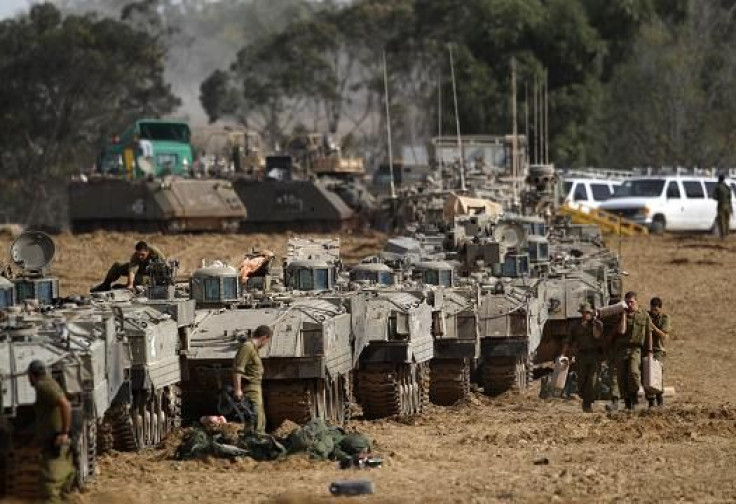Israeli Airstrikes Destroy Hamas Headquarters; 70,000 Reservists Called Up In Preparation For Possible Ground Invasion

Israeli airstrikes hit Hamas headquarters in Gaza early Saturday as the violence between Israel and militants in the Gaza Strip escalated and international pressure mounted for both sides to halt the bombardment.
Israel widened its air campaign against targets in Gaza, which started four days ago after Hamas militants fired rockets into Israel. By Friday, Hamas' rockets had targeted Jerusalem and Tel Aviv, and the Israeli cabinet authorized the mobilization of as many as 75,000 reservists to prepare for a possible ground invasion of Gaza.
Hamas officials confirmed that there was extensive damage to the prime minister's headquarters, a mosque and houses in the compound, and they said the building was targeted four times, although the New York Times reported that the Israeli military claimed it made five strikes against prime minister's offices. The building housed Prime Minister Ismail Haniyeh’s office, where Haniyeh had met with Egypt's Prime Minister Hisham Kandil on Friday.
"The headquarters was completely destroyed and neighboring houses were damaged as a result of the barbaric Israeli bombing," a Hamas official said, the AFP reported.
The Israeli military claimed it struck more than 200 targets, including underground rocket launchers and smuggling tunnels in Rafah, which is located on the Gaza-Egypt border. It said in a statement that it had also struck the Hamas police and homeland security headquarters, and the house of a Hamas commander, Ahmed Randor.
Israel military spokespersons confirmed the attack on Haniyeh’s office and said 367 rockets were fired from Gaza, of which 222 were intercepted with the Iron Dome anti-missile system.
Officials in Gaza said 41 Palestinians, including 20 civilians, had been killed in the ongoing strikes, while three civilians were killed in Israel Thursday.
The rocket strike on Jerusalem is surprising as it is considered a holy city by Jews, Muslims and Christians, and it had not been a target of attacks since 1970.
Israeli Prime Minister Benjamin Netanyahu held a four-hour strategy session with the senior ministers and military officials Friday night to decide on widening the scope of the military operations against Hamas government, according to Reuters.
"The Israel Defense Forces will continue to hit Hamas hard and are prepared to broaden the action inside Gaza," Netanyahu said before the rocket attacks on the two cities.
Israel has closed all roads to the Gaza border amid preparations for a possible ground attack.
Peace Negotiations
Egyptian Prime Minister Hisham Kandil’s visit to Gaza has raised hopes on fresh negotiations for truce in the region.
The U.S. and U.N. believe that Egypt, which has close ties with Hamas, can facilitate negotiations for peace in the region. President Barack Obama spoke to Netanyahu on Friday, reaffirming the United States' support for Israel’s right for self defense while he expressed regret over the loss of civilian lives in Israel and Gaza.
Obama spoke to Egyptian President Mohammed Mursi and lauded Egypt’s efforts to bring peace in the region.
U.S. Secretary of State Hillary Clinton spoke to the foreign ministers of Israel and Egypt and to Jordan's King Abdullah, advocating for Egypt’s mediation efforts to broker a cease-fire, Reuters reported.
"We believe that Egypt has an important leadership role to play on this. It has the relationships in Gaza. The PM traveled there yesterday ... so we believe that they have the stature, the credibility and the relationships to be able to persuade Hamas and its allies to stop," a State Department official who was traveling with Clinton in Singapore said, according to Reuters.
U.N. Secretary-General Ban Ki-moon is scheduled visit Israel and Egypt next week to push for cease-fire and truce in the region.
© Copyright IBTimes 2024. All rights reserved.












